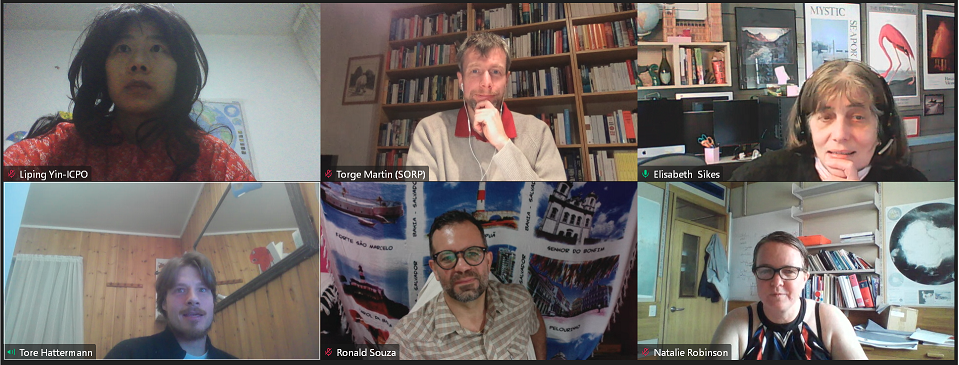CLIVAR/CliC/SCAR SORP held the first monthly telecon of 2022

The January telecon in 2022 of the CLIVAR/CliC/SCAR Southern Ocean Region Panel (SORP) was organized on 11th January. The proposed CLIVAR Exchange issue, the update of the tasks of SORP, and the status of the fieldwork were discussed.
SORP is planning to organize a special issue of the CLIVAR Exchanges, aiming at highlighting research, data, and networks of less known Antarctic programs providing novel insight on physical and biogeochemical processes of the Southern Ocean. Toward this end, SORP has prepared an online questionnaire, inviting participation and gathering information for the editorial introduction of the issue. SORP warmly welcomes the community to visit the online questions and leave the contact. The online questionnaire system will be closed on March 10, 2022.
Torge and Liz reported the progress of the current tasks. The freshwater release experiment task was in good function and monthly meeting was organized. Some new non-SORP members have joined or will join the team and Torge built a new SLACK space so that the non-SORP members can join in the SLACK conversation.
After the kick-off of the Southern Ocean Decade on 9th July 2021, and following the successful Southern Ocean Decade & Polar Data Forum Week 2021 (20-24 September 2021), the SO UN Decade updated webinar was held on 1st December, the Antarctic Day. The next step will be the Town Hall at the Ocean Science Meeting (OSM): Defining the future of the Southern Ocean-A contribution to the United Nations Decade of Ocean Science at 12:00 PM-1:00 PM (UTC-5) on 24th Feb 2022.
In addition to the Town Hall, SORP will organize a session at the OSM: HL16 Sources and consequences of Southern Ocean freshening: Toward synthesizing observations and modelling, which will be held at 5:00 PM-6:00 PM (UTC-05:00) on 4th March.
In the end, the members talked about the current situation of the fieldwork in their countries. Natalie introduced the rebuilding of the Scott Base in New Zealand. Tore and Liz mentioned the problems that the long-term observation infrastructures were facing in current days, the out of energy of the battery for example. The COVID-19 had made the fieldwork more difficult.











Add new comment